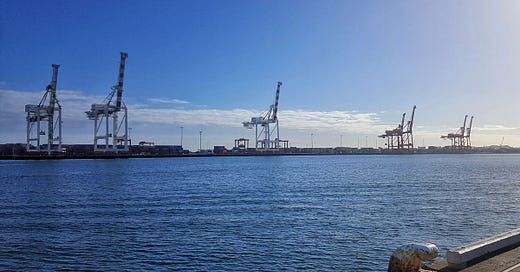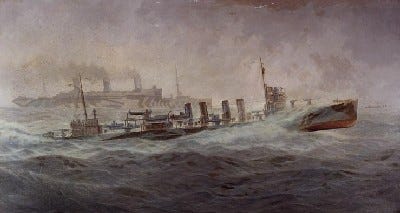Well, yes - as we discussed yesterday, THEIR pirates are bad. Today we’ll discuss how OUR pirates are good.
OK, our pirates are actually legal - let me tell you why.
In the second half of last Sunday’s Midrats podcast with Dr. James Holmes, we continued our lament that we simply do not have the merchant fleet nor even the combat logistics ship for any extended fight in the Western Pacific - especially if the USMC insists in operationalizing its EABO concept.
It takes years to decades to get a real shipbuilding program up to speed to build a merchant fleet of any size, and while on paper our allies might be able to help - nations have agency of their own. South Korea and Japan may have their own priorities … and in any event, many of their own shipyards are under the People’s Liberation Army Rocket Forces’ range rings anyway.
On top of it all, unlike in 1941 when we had a serious investment in the shipbuilding industry given a boost starting in 1936 when smart people in Congress saw the need for the coming war - we see nothing like that happening now.
War is very much a come-as-you-are affair, so where on short notice can we find the merchant ships we need?
Well, our friend Sal Mercogliano DM’d me a nudge to something during the live podcast I had no idea existed in maritime and international law for centuries … and has been used by the United States when it faced similar challenges.
I give to you, The Right of Angary;
Don’t ask me to pronounce it, but I can give you the working definition;
ANGARY (Lat. jus angariae; Fr. droit d’angarie; Ger. Angarie; from the Gr. ἀγγαρεία, the office of an ἄγγαρος, courier or messenger), the name given to the right of a belligerent to seize and apply for the purposes of war (or to prevent the enemy from doing so) any kind of property on belligerent territory, including that which may belong to subjects or citizens of a neutral state. Art. 53 of the Regulations respecting the Laws and Customs of War on Land, annexed to the Hague Convention of 1899 on the same subject, provides that railway plant, land telegraphs, telephones, steamers and other ships (other than such as are governed by maritime law), though belonging to companies or private persons, may be used for military operations, but “must be restored at the conclusion of peace and indemnities paid for them.” And Art. 54 adds that “the plant of railways coming from neutral states, whether the property of those states or of companies or private persons, shall be sent back to them as soon as possible.” These articles seem to sanction the right of angary against neutral property, while limiting it as against both belligerent and neutral property. It may be considered, however, that the right to use implies as wide a range of contingencies as the “necessity of war” can be made to cover.
Let me summarize it for folks like me who need things you pay lawyers billable hours to handle explained to them like they are a small child or a golden retriever;
You are a nation at war.
You need more ships than you have.
You have neutral ships in your port or - perhaps even if I stretch the idea - waters you control.
You can take those ships for your use, as long as you promise to return them or pay the owners for their use.
We did that in World War One and World War Two.
Check this out from the Minnesota Law Review 1918
THE recent requisition of Dutch ships in American ports affords us an interesting example of a revival of Jus Angariae, or as it is sometimes called Prestation. 1-This right has had a varied and often highly controversial history. In its origin it signified the right of the sovereign, or other public authority, to employ compulsory service for the carriage of messages.2 It was essentially a royal prerogative, very similar in character to certain feudal claims, such as the right of purveyance.
…
The exercise of this right became so vexatious to neutrals that a series of treaties were drawn up in the 17th and 18th centuries, in some cases abolishing and in others modifying the practice.6 According to the terms of some of these agreements, the states mutually agreed to prohibit the seizure of ships or merchandise for public purposes, either in times of peace or war.
By the treaty of 1785 between Prussia and the United States,7 Article 16, it was provided "that the subjects or citizens of each of the contracting parties, their vessels and effects, shall not be liable to any embargo or detention on the part of the other for any military expedition or other public or private purposes whatsoever." In certain other cases, where the right of angary was conditionally recognized, it is expressly stipulated that the neutral owners shall be fully compensated for their services.
In the revision of the treaty with Prussia in 1799, the above clause was eliminated, and in its place there was inserted a provision authorizing the requisition of vessels of the respective countries, but providing that "the proprietors of the vessels which shall have been detained whether for some military expedition, or for what other use soever, shall obtain from the government that shall have employed them, an equitable indemnity, as well for the freight as for the loss occasioned by the delay." Similar stipulations are to be found in a number of treaties with the Central and South American states.
I’d like to take an extended part in the next pull-quote because it gives us a taste of another era that was perhaps more refined in its expectations of a learned man.
The Minnesota Law Review back in 1918 expected you to understand French, and as such, was comfortable quoting in French without translation.
The right of angary in many respects resembles an embargo. But the two powers, as Calvo points out: "different dans leur nature comme dans leurs effets." An embargo "pour etre legitime, doit etre general, restreint dans les plus etroites limites et fonde sur des raisons majeui-s: il n'implique, le plus communement, que la responsabilite morale du° gouvernement qui l'exerce."
The right of angary "au contraire, est essentiellement special, et, en raison des risques et des charges onereuses qu'il impose au navire qui le subit, il engage la responsabilite materielle et financiere de l'Etat qu'une necessite d'ordre superieur condamne a recourir."
Neutral crews, it will be observed, are no longer forced to become active participants in the war. The neutral property only remains liable to seizure for military purposes. In other words neutral ships in certain exigencies are treated the same as 'national property.
"The object of the right of angary" says Oppenheim," is such property of subjects of neutral states as retains its neutral character from its temporary position on belligerent territory, and which therefore is not vested with enemy character. All sorts of neutral property, whether it consists of vessels or other means of transport or arms, ammunition, provisions, or other personal property, may be the object of the right of angary, provided the articles concerned are serviceable to military ends and wants. The conditions under which the right can be exercised are the same as those under which private enemy property can be utilized or destroyed, but in every case the neutral owner must be fully indemnified."
If your mind is hurting from the French and you’re still wondering how long the idea of Angary has been with us, and where that word even comes from, here’s some Latin to round out your Tuesday;
The origin of the right of angary is traceable to early Roman times, and a study of its origin and development throws much light on the right as it is understood today. Several writers on international law refer to the first chapter, 41st verse, of Saint Matthew’s Gospel, as showing a possible origin of the term angary. This verse reads:
Quicumque te angariaverit mille passus, vade cum illo et alia duo. (And whosoever shall compel thee to go one mile, go with him two.)
The Greek word for compel or force is also cited, and it is clear that the idea of compelling some service was linked up with the early notion of angary.
The following passage from the Justinian Code (529 A.D.) shows the word angary in its noun form, and shows that all classes alike were subject to the law:
Nullus penitus cuius libet ordinis seu dignitatis, vel sacrosancta ecclesia, vel domus regia tempore expeditionis excusationem angariarum seu parangarium habeat.
“I had some substantive work -- a memorandum on the right of angary; the US early in 1941 impounded and took over numerous ships in American ports.”
Leonard C. Meeker; Experiences; Xlibris; 2007.
We are always told to “think outside the box” - so stick with me here. Have an open mind, be patient, and try to put yourself in the mind of an unprepared nation at the start of a global war that all of a sudden realizes it isn’t ready to rumble. You might as well exercise that mindset - because this is the world you live in at the dawn of 2024.
If we find ourselves in a shooting war with the People’s Republic of China (PRC), we will be challenged, unlike anything we have seen in living memory except for those very few over the age of 55 who were but wee JOs when the Soviet Union fell.
I don’t see any move to build more ships over the next couple of POM’s, but when the war comes, the peacetime green eye-shade Admiralty is invited to pursue excellence elsewhere, and the powers-that-be call all the jerks and a55holes to fix things, it will take about 5-minutes for them to say, “We need to beg, borrow, or steal every ship afloat.”
The math is that simple … especially when it is your job to reach west of the international date line to fight a war.
So, where do we get those ships?
Look to angary and your ports and territorial waters.
This is where the USCG and USNR come into play.
At D+0.5 we need to stop everything from leaving or coming into our ports. The obvious security issues are clear, but in a just world, there would be PLAN SALAMANDER on the shelf waiting to be brushed off and the maritime assets - modest as they are - to execute it. No time to fiddle around. Ships move faster than you think.
The USCG along with the few states that have naval militias like New York and Texas should be able to stop ships from leaving ports, but it would be helpful if we had A LOT many more assets for what follows.
Of all the armed services, the USNR is used the least for a whole host of the worst reasons imaginable. We should have many more harbor security units than we have now and a lot of Visit, Board, Search, and Seizure (VBSS) in the USNR.
Sure, I can at peace make up all sorts of cover stories about why we have so many USNR port security and VBSS teams, but I will tell you what their mission will be once the balloon goes up (hopefully we’ll have some warning so they can move at D+0.5), they will go seize first any PRC owned ship in port or transiting territorial waters and then will do the same for any “neutral” shipping.
Of course, we will have a challenge finding the mariners to man the ships - but if you are creative, it is easier to fix the personnel problem than the gross tonnage problem.
So, there you go. A larger merchant fleet. Get some paint, change some names, and authorize your lawyers overtime. All legal and everything. It also is an excuse to better utilize the USNR.
Hoist the jolly roger with pride. We have a war to win.







Sal, this might turn out to be the most valuable thing you have ever written. BZ.
I know next to nothing about things maritime, except having been ship's physician for National Geographic a couple of times. My knowledge of things martial is limited to some years as an ANG flight surgeon. But I love your posts and learn something every time I read them. I am a 59 year old emergency physician very anxious about the coming war. Tried to offer my services to the USNR but they were not particularly interested. I suspect when things go badly, I may receive a call. Keep up the great writing!